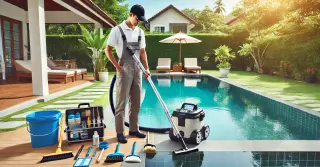Residential Pool Maintenance Eastport ME

Thorough pool maintenance for homes starts with regular cleaning and debris removal. Ensuring your pool is free from dirt, leaves, and other debris is crucial for both appearance and hygiene.
- Skimming and Vacuuming: Regular skimming and vacuuming are important activities to keep your pool clean. Utilize a pool skimmer to clear floating debris like leaves and insects, and vacuum the pool bottom to remove dirt and sediment. This keeps the water clear and prevents the growth of algae and bacteria.
- Scrubbing Pool Surfaces and Tiles: Make sure to clean the pool walls and tiles consistently. Brushing the walls and cleaning tiles stops algae, calcium, and residue accumulation. Use a pool-specific brush, whether it’s plaster, fiberglass, or vinyl, to avoid damage. Routine cleaning keeps your pool pristine and extends its life.
Balancing Water ChemistryBalancing the water chemistry is crucial for the safety and comfort of swimmers. Optimal chemical levels stop algae, bacteria, and other contaminants, while protecting your pool’s structure and components.
- Testing and Adjusting Chemical Levels: Consistently test your pool water to monitor chemical levels, including pH, chlorine, alkalinity, and calcium hardness. Use a high-quality pool test kit to ensure precise readings. Make adjustments as required to ensure balanced water. Well-balanced water prevents corrosion, scale buildup, and cloudy water, providing a safe and enjoyable swim.
- Safe Pool Chemical Handling: When using pool chemicals, always adhere to manufacturer instructions and wear appropriate safety gear, such as gloves and safety glasses. Add chemicals in the correct order, and avoid mixing them directly, as this can cause harmful reactions. Keep chemicals in a cool, dry area, out of reach of children and pets. Using chemicals properly ensures safety for all and keeps your pool water pristine.
Consistent Equipment Checks and UpkeepRegular inspection and maintenance of pool equipment are essential for efficient pool operation. This includes pumps, filters, heaters, and chlorinators, which are essential parts in maintaining a clean and functional pool.
- Checking and Cleaning the Pool Pump and Filter: Frequently inspect your pool pump and filter to ensure proper function. Clean or replace filter cartridges as necessary for optimal filtration. A well-functioning pump and filter keep the water clear and free of contaminants, reducing the workload on your chemical treatments.
- Maintaining Heaters and Chlorinators: Verify that your pool heater and chlorinator are working properly. Check for signs of wear and tear, such as leaks, corrosion, or malfunctioning parts. Consistent maintenance and timely fixes can prevent costly breakdowns and extend the life of your equipment. A well-maintained heater ensures pleasant water temperatures, while a working chlorinator keeps the water sanitized.
Residential pool maintenance requires regular cleaning, water balance, and equipment care. By adhering to these practices, you can enjoy a safe, clean, and inviting pool throughout the swimming season.




